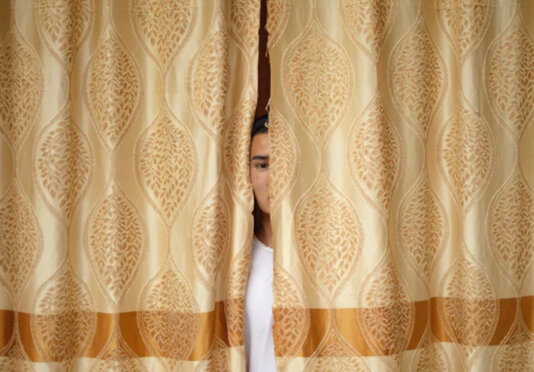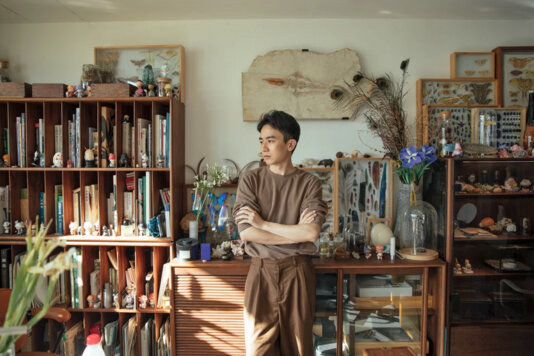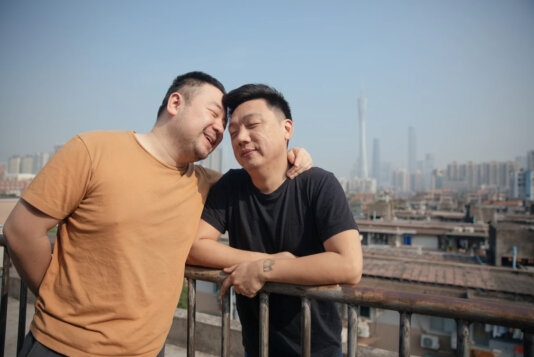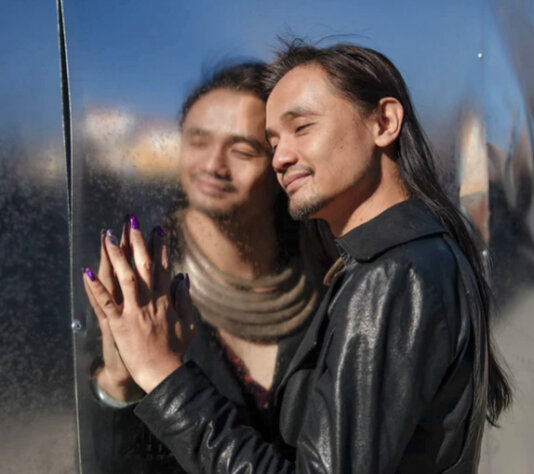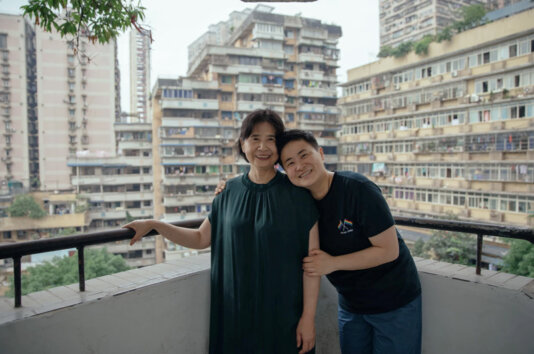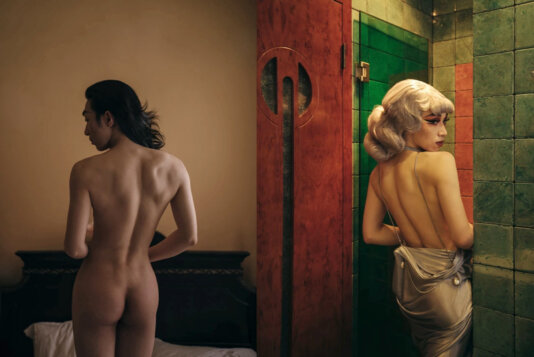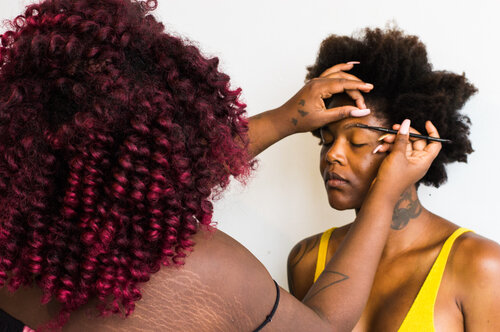- About
- Topics
- Picks
- Audio
- Story
- In-Depth
- Opinion
- News
- Donate
- Signup for our newsletterOur Editors' Best Picks.Send
Read, Debate: Engage.
| April 18, 2022 | |
|---|---|
| topic: | Arts |
| tags: | #AllOut, #China, #LGBTQ+, #art |
| located: | China |
| by: | Sasha Kong |
Looking straight into the camera with a burning gaze, prominent Chinese LGBTQ+ activist Shawn Zhang exudes a level of emotional maturity and determination that exceeds his young age. Despite China’s tightening grip on the gay community, Zhang appears to remain optimistic and promotes LGBTQ+ rights with a dash of humor.
In China, homosexuality was decriminalised in 1997, but same-sex marriage has remained illegal and LGBTQ+ content is often censored in the media.
Coming out in China is still challenging. It took Zhang about a decade to fully realise his sexual orientation, and that was a life-changing moment for him. Years of emotional suppression turned into vocal support of queer rights, including organising the now-banned Shanghai Pride parade, sharing his own experience of coming out to raise awareness and volunteering to assist schoolteachers in imbuing gender equality in curriculums.
In his latest campaign, the 26-year-old brought out the individual stories of transgender, gay and lesbian people in China by featuring them in creative and artistic portraits.
The photo series, published by AllOut - an international queer rights group, tells the tales of over 100 people from the world’s largest LGBT population.
FairPlanet: How did you come to realise your sexual orientation?
Shawn Zhang: "It took me 10 years. When I was in grade five [in northern China], I paid more attention to boys than girls, but at that time it didn’t come across that I am homosexual. I like hanging out with girls and was boycotted for speaking in a feminine manner. I was the class president at the time, but some classmates refused to listen to me, and I think it’s because I didn’t appear to be traditionally masculine.
"In high school, I fell in love with a straight guy friend. At the time, some girls told me they had feelings for me, but I didn’t know who I was back then, so I didn’t handle it very well. At the time, I moved towards having a traditionally masculine façade.
"I met someone openly gay in university - he matches the image of gay man in northern China. But the suppression he said he had faced pushed me deeper into the closet, and I felt that I should be different from him. I dated a girl once, but I felt like it was a lie to myself, and we later broke up. But when my high school crush started dating a girl, I couldn’t sleep and felt depressed. I couldn’t hide from the truth: I am gay."
Can you tell us how you came out to your family? What was their reaction?
"I first started coming out to a stranger I knew for only a week, because my gut feelings told me he could be gay. I couldn’t predict how bad his reaction would be, but if he couldn’t accept it, the [emotional] risks were low. He then became my first-ever boyfriend. I realised coming out wasn’t that difficult.
"I started coming out to friends from university and high school, including one of the girls who told me about her feelings for me in the past. We became close friends after the chat. I also plucked up courage to tell my high school crush, and he gave me a kind answer, but he refused to hang out with me ever since.
"With my mother, I took my time. I spent a year laying clues, like telling her about the gay people around me, taking her to watch movies with homosexual scenes, and watching a reality show on TV about gay people coming out. She asked me at the time if I was gay, but I was too guarded to admit it.
"Then I started dating my first boyfriend, and during a trip with my Mom, I was addicted to my phone and kept giggling about - all signs of dating. I had to admit I was gay to her, and she said she felt pain for at least half a year after. She told me it was like a 'death sentence' to her, and secretly hoped that I was bisexual so I could still have a 'normal' marriage."
Zhang’s mother slowly embraced her son’s sexual orientation and the community he belongs to. After getting to know other LGBTQ+ people, she warmed up to the community and started doing voluntary work together with Shawn. They are still thick as thieves today.
Coming out to Zhang's father, however, was a lot more difficult, the young artist said.
"My father doesn’t live with us in Shanghai - he’s back in Tianjin for family affairs. I came out to him about a year and a half ago, but he has refused to talk to me since then. I asked several times to dine with him and hang out, but he refused and has been silent with me."
Zhang’s mother is often caught in the middle between the two. Even when the three are in the same house sometimes, his father would only talk to Zhang through her. He attempted to introduce women to Shawn, but it was shut down by his mother each time.
In an open letter online, Zhang wrote to his father, "sexual orientation isn’t anyone’s fault. I don’t blame anyone or myself. I can accept the fact that you don’t accept this."
What are some of the volunteering work you are doing?
"Shanghai is more open to gay people than my hometown in northern China. There aren’t a lot of gender rights organisations here in Shanghai, but they are a great transit point for LGBTQ activists.
"I am now helping a group in gender equality education and offer casual consultation to children in need. A few years ago gay and lesbian activists could enter schools to tell students their tales of school bullying and coming out. It was very powerful, but now policies tightened, and we are barred from going into campuses, so we decided to offer trainings to teachers who encountered school bullying due to gender identities, or their students come out to them.
"We offer materials to them so they can integrate gender content into classes."
Are you worried about China’s crackdown?
"Last year, I was contacted by the police eight times, asking me to write a letter of guarantee for not publishing such content online or trying to obtain more information from me or threatening me or trying to see if I have anything to do with embassies.
“The more you talk with people, the less you realise you can do. I just want to survive here, and do more when I am still passionate. Under the current circumstances, proactively trying to make changes can be dangerous, so I’ve moved my campaign online. We become more cautious, and keep changing strategies.”
This comes after Shanghai Pride’s organisers halted their operations in 2020, citing the need to protect people’s safety. In 2021, Chinese tech giant Tencent moved to delete dozens of LGBT accounts of university students on the country’s Twitter-like platform Weibo. In January this year, gay dating app Grindr dropped off from China’s app stores amidst the Communist Party’s increasing control of online content they deem harmful.
"Under the current circumstances, proactively trying to make changes can be dangerous, so I’ve moved my campaign online. We become more cautious, and keep changing strategies."
What was your inspiration for the photo series? How did you find these people?
"I knew of a German photographer who took photos of same-sex couples in a series that features a grey tone, which seems to signify that these people are still living a gloomy life. But I don’t think it’s the case, and I think it was a very western angle.
"I wrote an ad to recruit people for participating in this [Better Together] photo project. I went everywhere [in China] to take photos of the people, who told me very different stories from people in Shanghai. The texts in the series were written by the participants.
"I listened to many stories. Everyone has a different path, and I realised much about self-identity and personal relationships with others."
What are the biggest messages you want to convey to viewers through your photo series?
"I think it’s about the meaning of life - what’s the purpose of life? My answer is: just living itself. People should feel love and beloved. We can all be braver to love and enjoy happiness.
"I am like a beacon, and everyone can see my light, and I need more people to [raise awareness] with me. I don’t need people to all become a beacon, but I hope they can transfer the light to others and raise awareness in the country. Big cities are better, but third-tier cities are not very open - I hope these power and awareness can reach there, so people can start discussing and coming out."
Image by Shawn Zhang
By copying the embed code below, you agree to adhere to our republishing guidelines.
